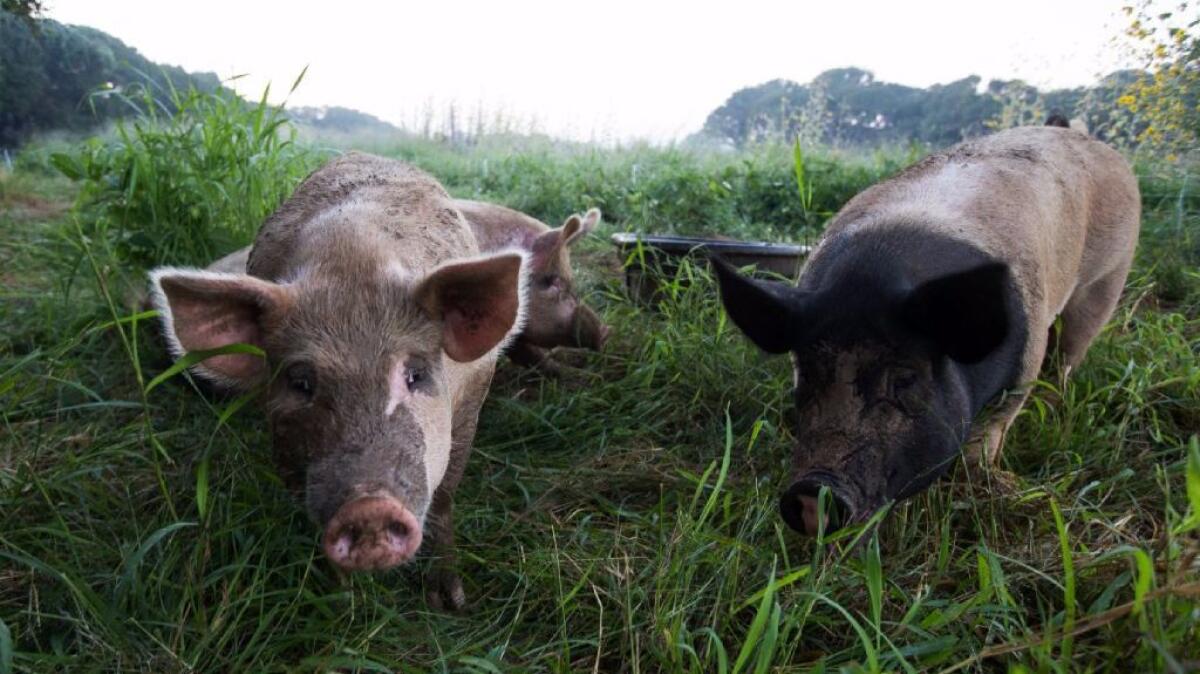Pigs can be optimists or pessimists, depending on personality and mood, study finds

- Share via
You can’t keep a positive pig down. A new study finds that, like humans, pigs can be optimists or pessimists, and that the pessimists are more strongly affected by their current environments.
The results, described in the journal Biology Letters, hint that the complex interplay between personality and mood may extend far beyond the human experience.
“This finding demonstrates that humans are not unique in combining longer-term personality biases with shorter-term mood biases in judging stimuli,” the study authors wrote.
Is that glass half empty, or half full? Scientists already know that humans process information differently depending on their mood: If they’re feeling negative, they’ll tend to expect a worse outcome when facing ambiguous situations that could go either way; if they’re feeling positive, they may expect a better one. Mood, together with baseline personality, influences a person’s cognitive bias — patterns of thinking that may lead to deviations in good judgment.
Researchers have increasingly looked at cognitive bias in animals to study animal mood, the study authors wrote, but the results from these experiments have been inconsistent. Perhaps that’s because the interaction of personality and mood, which together generate cognitive bias in humans, hadn’t really been studied in animals until now.
For this paper, a team of scientists from Great Britain looked to probe that mood-personality dynamic in 36 domestic pigs, animals known for their intelligence. The researchers tested whether they had proactive or reactive personalities by studying how they behaved in an area with an unknown object. Proactive behavior is more active and less flexible; reactive behavior is more passive and more flexible. (In humans, proactivity has been linked to extraversion and reactivity has been linked to neuroticism.)
The scientists also tested their cognitive bias by training the pigs to recognize that the bowl in one corner of the room had yummy chocolates (a good outcome) and the bowl in the other corner had bitter coffee beans (a bad one, presumably). They’d been coated in sugar so that the pigs couldn’t sniff them out until they reached their chosen bowl. The researchers then began putting more bowls in ambiguous spots — in the middle of those two corners, or slightly toward the chocolate corner, or slightly toward the coffee corner.
Before the tests, the animals would be put either in economy or deluxe lodgings. Both had solid floors, a slatted area and wooden blocks on chains for what the study authors called “enrichment.” But the deluxe lodgings were roomier and had deep, comfy straw.
The scientists found that the pigs with proactive personalities tended to check out the middle bowl, even without the sure promise of a reward, regardless of the quality of their accommodations. Being stuck in the economy lodgings didn’t change their underlying optimism.
Pigs with reactive personalities, on the other hand, were more optimistic about their chances of finding a chocolate in the middle bowl if they’d had the deluxe accommodations — and more pessimistic if they’d been in the less comfortable pen. Reactive animals, then, were much more affected by their environment, and their mood likely skewed their choices.
“These results suggest that judgement in non-human animals is similar to humans, incorporating aspects of stable personality traits and more transient mood states,” the authors wrote.
The findings could help explain why previous tests of cognitive bias in animals were so inconsistent, the researchers said.
“Because proactive pigs behaved differently to reactive pigs, these findings could explain some of the inconsistent results between animal cognitive bias tests,” the study authors wrote. “Accounting for personality differences between individuals may reduce some of this otherwise unexplained variation, making cognitive bias test outcomes more reliable and robust.”
Follow @aminawrite on Twitter for more science news and “like” Los Angeles Times Science & Health on Facebook.
MORE IN SCIENCE
Faster than a speeding swift: Bats beat birds at their own airborne game
Dinosaurs and their ancestors lived side by side, fossils show
Why are we ticklish? Scientists who tickled rats offer an intriguing answer






